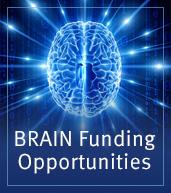
NIH has issued new Requests for Applications (RFAs) for the NIH BRAIN Initiative® that address critical components of the BRAIN 2025 Report including the development of new theoretical and data analysis tools, the establishment of platforms for sharing data, and continued support of early-stage research in large-scale recording and modulation.
NIH recently released additional notices of funding opportunities (NOFOs) for fiscal year 2017 to support work in the BRAIN Initiative. Three new, related NOFOs share a common goal of advancing research by creating a community resource data archive with appropriate standards that is broadly available and accessible to the research community. Finally, the fourth NOFO, re-issued from fiscal year 2016, seeks projects that advance neuroscience through new concepts for technologies related to large-scale recording and modulation.
The first announcements, RFA-MH-17-255, RFA-MH-17-256, and RFA-MH-17-257, are inter-related and are aimed at building an informatics infrastructure for the BRAIN Initiative.
- RFA-MH-17-255, solicits applications to develop web-accessible data archives to capture, store, and curate data related to BRAIN Initiative activities. The receipt dates for RFA-MH-17-255 are January 17, 2017 and October 19, 2017.
- The second announcement, RFA-MH-17-256, solicits applications to develop standards that describe experimental protocols that are being conducted as part of the BRAIN Initiative, which will be made widely available. The receipt dates for this RFA are January 10, 2017 and October 11, 2017.
- The third announcement, RFA-MH-17-257, solicits applications to develop informatics tools for analyzing, visualizing, and integrating data related to the BRAIN Initiative or to enhance our understanding of the brain. The receipt dates for this RFA are January 19, 2017 and October 26, 2017.
The MH-17-255 data archives will use appropriate standards – a component of MH-17-256 – to describe the data, and will rely on the research community to incorporate tools that allow users to analyze and visualize the data – the goal of MH-17-257.
The fourth announcement, RFA-EY-17-001, is a re-issue of EY-16-001 for unique and innovative technologies that are in early stages of development, including new and untested ideas related to large-scale recording and modulation that are in the initial stages of conceptualization. This NOFO supports work that enables calculations, simulations, computational models, or other mathematical techniques for demonstrating that signal sources and/or measurement technologies are theoretically capable of meeting the demands of large-scale recording or manipulation of circuit activity in humans or in animal models. The receipt date for this RFA is December 7, 2016.
Please visit our Active Funding Opportunities page for more details on these and other RFAs for the BRAIN Initiative. We anticipate that several other NOFOs will be issued in the near future.
